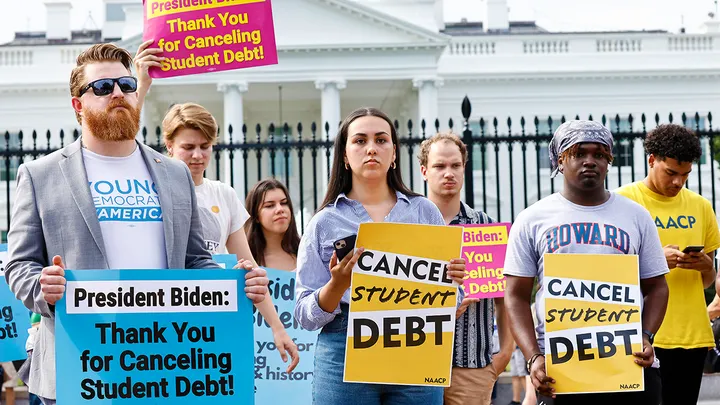
The Biden administration’s relief program to forgive billions of dollars of student loan debt is facing a challenge from six GOP-led states that claim the plan is an overreach of the executive branch.
The program, which could benefit about 40 million Americans and offer up to $20,000 of debt relief to qualified at-risk federal Pell Grant borrowers and $10,000 for non-Pell Grant recipients, is being supported by 21 Democrat-led states and the District of Columbia.
The program is expected to wipe out balances for almost 40% of federal student loan borrowers, but new applications for relief were halted in November as the policy’s future was held up in court.
The U.S. Supreme Court heard two expedited legal challenges on Tuesday. The state parties cite policy objections and say they would be unfairly burdened by the Biden plan.
However, the Biden administration told the high court its debt relief efforts “fall comfortably within the plain text of the [HEROES Act]” and was a reasonable, targeted solution to confront the risk of default based on lingering financial hardship caused by an unexpected public health crisis.
The GOP-led states are arguing that the Biden administration is using the waning health crisis as a pretext power grab to bypass Congress and score political points.
States opposing the plan say students struggling with paying off college loans predated the pandemic. When announcing the program last August, President Biden said, “When I campaigned for President [in 2020], I made a commitment that we’d provide student debt relief. And I’m honoring that commitment today.”
Officials call it part of a broader strategy to implement an affordable, income-driven repayment system.
However, conservative advocacy groups have criticized the debt relief plan, with Elaine Parker, president of the Job Creators Network Foundation (JCNF), saying it “does nothing to actually solve” the student debt crisis.
Parker claims colleges and universities should work with lawmakers to devise a solution that does not leave taxpayers on the hook.
The first hurdle for the Republican states will be standing, or justification to prove actual harm by the challenged policies. According to Thomas Dupree, an appellate attorney and former top Bush Justice Department official, “From the perspective of most Americans, we’re obviously nowhere near the place we were several years ago when this whole pandemic started.”
Dupree questions whether the Biden administration overstepped its bounds in authorizing this massive debt forgiveness program in a way that Congress never authorized.
Ultimately, the Supreme Court will have to decide whether the Biden administration’s debt relief program is an overreach of the executive branch or a reasonable, targeted solution to confront the risk of default based on lingering financial hardship caused by an unexpected public health crisis.
